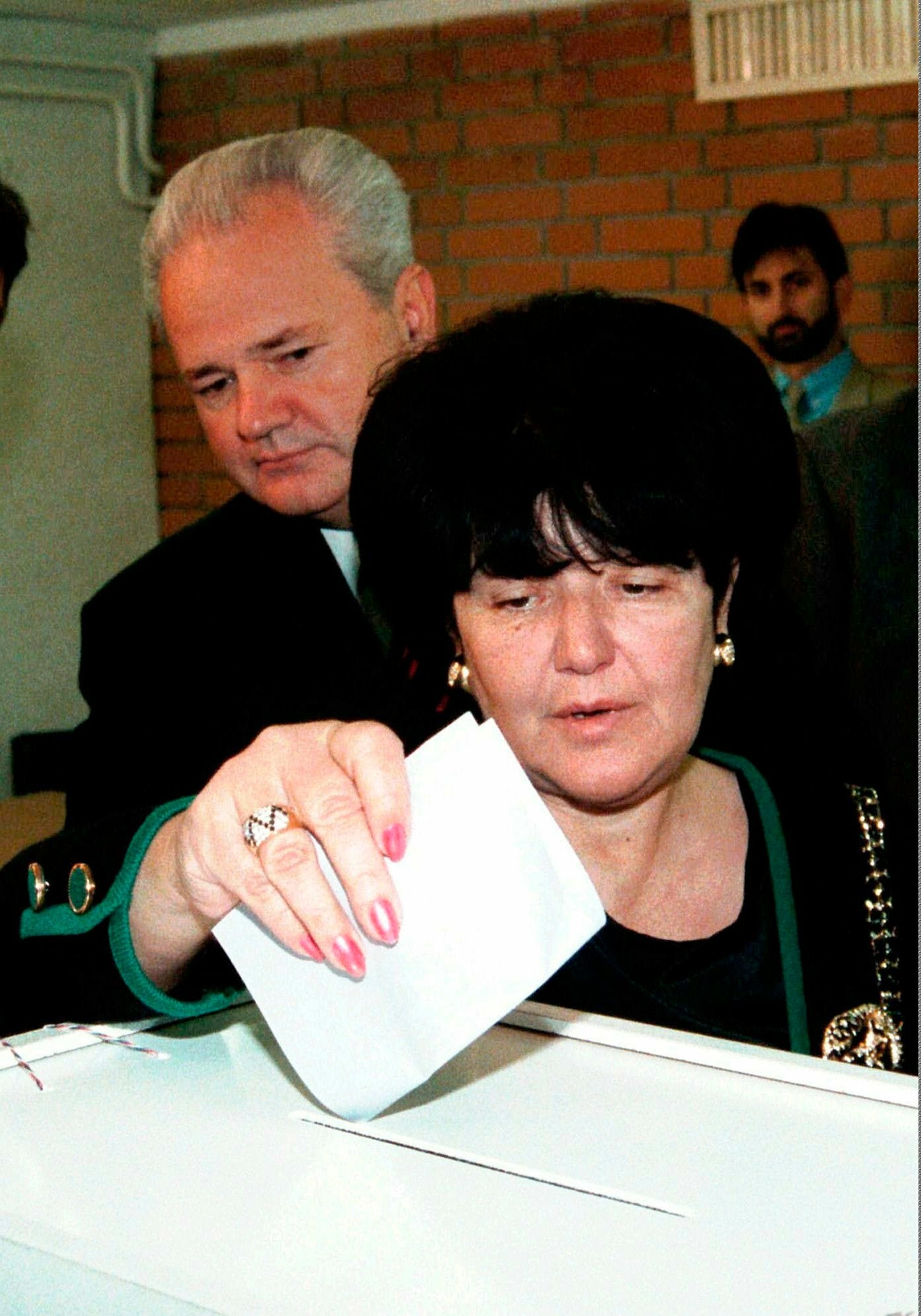Mirjana Markovic: Serbian politician regarded as the brains behind Milosevic
The ‘Lady Macbeth of the Balkans’ was a pivotal influence on her husband in a period that led to accusations of genocide

Dubbed Lady Macbeth of the Balkans for her powerful hold over her husband, Mirjana “Mira” Markovic was a devoted communist and a principal architect of Slobodan Milosevic’s rise to power in the former Yugoslavia.
As political adviser to Milosevic – whose tyrannical reign over the disintegrating Yugoslavia in the 1990s led to charges of war crimes – Markovic, who has died aged 76, was also his accomplice.
As the country disintegrated amid ethnic conflicts and civil war during in the 1990s, Milosevic seized control of Serbia. From the capital, Belgrade, he directed war efforts against other former Yugoslav states, including Croatia and Bosnia.
He was overthrown in 2000 after 13 years in power. Milosevic was arrested and charged with war crimes that included terrorism campaigns and genocide. Throughout her husband’s political life, Markovic wielded enormous influence over his thinking and was as feared by the Serbian public as he was. They were sometimes called, with a touch of derision, the “royal couple” of Serbia.
Markovic, who always used her maiden name, fled to Russia, in 2003, when warrants were issued for her arrest on charges of fraud, corruption among other crimes. She was widely believed to have helped plot the murders of journalists and several of her husband’s political rivals, although she was never formally accused.
A daughter of communist stalwarts, Markovic was born in a forest during the Second World War while her parents were fighting against Nazi forces. Her mother, Vera Miletic, whose nom de guerre was Mira, was captured by Nazis and tortured. Miletic was executed in 1944, when her daughter was two years old.
Historians have never established whether Miletic was killed by the Nazis or by her one-time communist colleagues, who suspected that she may have given up secrets during her captivity. All records about her disappeared from Yugoslav archives. Markovic became a fervent communist early in life and often wore a flower in her hair as a reminder of her mother.
While growing up in Pozarevac, in the former Yugoslavia, Markovic and Milosevic became inseparable in high school. The couple were married in 1965.
Markovic had a doctorate in sociology and taught Marxist theory for years at the University of Belgrade. Her husband, meanwhile, was gaining influence as he rose through the ranks of the Communist Party, first as director of a state-run energy company in the 1970s and later as head of the country’s largest bank.
In 1987, he elbowed aside his political mentor, Ivan Stambolic, to take over leadership of the Communist Party in Serbia, the largest republic in the Yugoslav federation. He seized control of once-autonomous regions, and ethnic nationalist tensions soon gripped the country. He formally became Serbia’s president in 1989.

Most observers believed that Markovic guided her husband’s political rise and helped orchestrate his moves to consolidate power. She was a writer and intellectual, and her husband had an aversion to newspapers and books.
Milosevic was re-elected in 1992 and 1996, but his authority, as leader of the last communist dictatorship in eastern Europe, had been reduced to the former republics of Serbia and Montenegro. Yugoslavia was breaking apart, as Croatia, Slovenia, Macedonia and Bosnia and Herzegovina all declared independence.
He espoused a doctrine of Serbian nationalism as civil war raged throughout a once-united country. Markovic formed a new political party, the Yugoslav United Left that, outwardly at least, sought to restore the glory of Yugoslavia.
If the political aims of husband and wife seemed at odds, their private bond remained strong. At a publishing event for one of Markovic’s books, her husband proffered a toast: “Here’s to you, kitten. May you always love me.”
In 2000, Ivan Stambolic, his former mentor, was considered a likely challenger to Milosevic until he disappeared a month before the September elections. His body was found three years later. At least four other close associates of Milosevic and Markovic’s were also killed, along with a prominent journalist, Slavko Curuvija.
When warrants were issued for Markovic’s arrest in 2003, she sought asylum in Russia, where she joined her son, Marko, whom she called “my wild young mustang”. A playboy and barfighter who crashed more than 20 luxury cars, Marko Milosevic amassed a fortune of hundreds of millions of dollars by his early thirties.
He fled Serbia after he was charged with threatening to dismember a former associate with a circular saw.
“Marko was threatening with a saw to cut someone up in pieces?” Markovic said in 2002. “That’s humour! That’s humour!”
Markovic’s daughter, Marija, ran a radio station and nightclubs in Serbia and was known for her taste for high fashion and nightlife, her many love affairs and her interest in firearms.
When her father was being taken to jail in 2001, Marija reportedly fired at least five shots at the arresting officers. She was also taken into custody, with three handguns in her possession.
Mirjana Markovic was born in 1942, near the village of Brezane, Serbia. Her parents were not married, and after one day her mother returned to fight with Yugoslav partisans. Markovic was raised by her grandparents.
She attended the University of Belgrade and the University of Nis and received a doctorate. She read French literature, seldom smiled and was said to have no sense of humour. Her hair was always dyed jet black, and most of her clothes were black – her colour of choice.
For years, Markovic wrote a twice-monthly magazine column, often about her roses and musings on nature. But observers parsed it closely to gauge the changing political winds in Serbia.
“Maybe it produces some confusion,” she said in 1993, “but I think such confusion can be helpful and useful.”
Asked to clarify what she meant, she replied, “Like I said.”
Nevertheless, she denied that she possessed any authority or was, in fact, the power behind the Serbian strongman’s throne. Still, enigmatic as always, she once remarked that men “have been saying and doing what they like for centuries, and look where that has got us.”
Slobodan Milosevic died in 2006 while still on trial for war crimes before a tribunal in The Hague. Markovic did not return to Serbia to attend his funeral.
Mirjana Markovic, politician, academic and writer, born 10 July 1942, died 14 April 2019
© Washington Post
Join our commenting forum
Join thought-provoking conversations, follow other Independent readers and see their replies
Comments